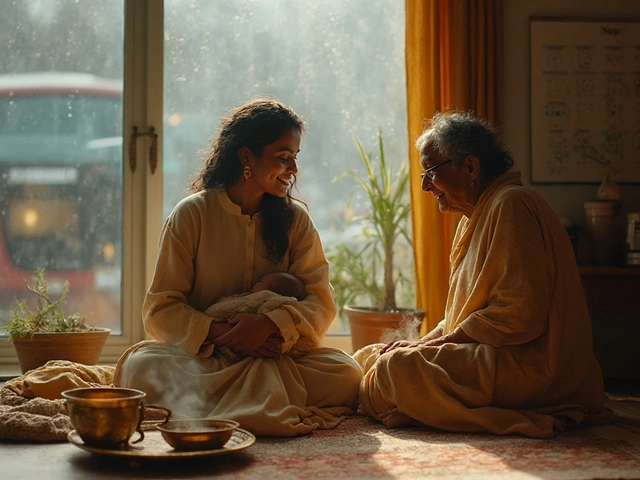
If you wake up just before sunrise, there’s actually a name for this in Ayurveda—it’s called the golden hour, or Brahma Muhurta. We're talking about the window that’s roughly 90 minutes before the sun peeks over the horizon. Sounds simple, but ask anyone who’s tried it consistently, and they’ll tell you it does something special for your mind and body.
This isn’t some old superstition. Ancient ayurvedic texts totally geek out over this time because it lines up with your natural body rhythms, when your mind is sharpest and your body is just waiting for a fresh start. Life feels quieter, you breathe deeper, and your head is clear. Even modern researchers notice that people who wake up early tend to feel less stressed and are more productive.
- Golden Hour: The Basics
- What Happens in Your Body
- Why Ayurveda Loves the Early Hours
- Best Practices During the Golden Hour
- Common Mistakes People Make
- Getting Started: Easy Tips
Golden Hour: The Basics
The so-called golden hour in Ayurveda isn’t some random feel-good phrase. In Sanskrit, it’s called Brahma Muhurta, which pops up in texts like the Charaka Samhita—one of Ayurveda’s main classics. This slice of time lands about 90 minutes before sunrise and wraps up just as the sun rises. If you live in India, this usually means anywhere from 4:00am to 6:00am, depending on the season. For other places, you’ll want to check the local sunrise and count back an hour and a half.
But what makes this time so important? Ayurveda says nature is perfectly balanced then—air is fresh, noise is low, and your mind is at its quietest. You’re not bogged down by yesterday’s worries or the day’s stress yet. The classic ayurvedic idea is: start your day when nature is calm, and you’ll bring that calm with you into the rest of it.
According to traditional sources, the qualities of the golden hour—lightness, clarity, and stillness—are at their peak. In Ayurveda, these match with the “Vata” dosha, which controls movement and space. Vata is high just before sunrise, so those peaceful, light vibes make activities like meditation, reading, and gentle exercise way more effective than later in the day.
Here’s a quick rundown how the golden hour compares to later hours of the morning:
| Time | Ayurvedic Name | Dominant Dosha | Main Qualities |
|---|---|---|---|
| 4:00-6:00am | Brahma Muhurta (Golden Hour) | Vata | Clear, light, creative |
| 6:00-10:00am | Kapha Kala | Kapha | Heavy, slow, grounded |
The takeaway? If you want to tap into your mind’s power or set a calm mood, timing really does matter. That’s why the golden hour is a big deal in ayurvedic routines and daily rituals.
What Happens in Your Body
During the golden hour, something cool happens inside you. Your hormones reset. Your cortisol—the body’s wakeup hormone—starts to rise naturally, telling you it’s time to get moving. That’s why you sometimes feel sharp and almost refreshed when you wake up early, even if you didn’t get a full eight hours.
Your digestive system is actually pretty chill at this point. Ayurveda says your golden hour is when digestion is calmer, so heavy food or snacks usually feel off. Instead, your system is ready for hydration and deep breathing. Your lungs soak up oxygen way better in these early hours, making your brain feel more awake.
You’ll also notice emotions might come up more gently. Stress hormones like adrenaline and cortisol aren’t spiking yet, so it’s easier to think clearly and not overreact to little things. Brain scans even show that thinking and memory are better in the morning, especially before lots of distractions pile up.
Here’s a quick look at what your body is doing during that time:
| Process | What’s Happening |
|---|---|
| Hormones | Cortisol rises steadily to help you wake up, melatonin (sleep hormone) drops off |
| Lungs | Oxygen absorption peaks, making it the best time for breathing practices |
| Digestion | Still resting, making light water or herbal teas ideal |
| Mental State | Brain handles focus and learning better, fewer distractions |
Bottom line, your whole system is actually primed for calm, focus, and a gentle wake up. Ayurveda just figured this out way before science got to it.
Why Ayurveda Loves the Early Hours
Ayurveda calls the golden hour "Brahma Muhurta." It’s about 90 minutes before sunrise, and if you’re up at this time, Ayurveda says your body and mind catch all the benefits that nature is offering. Why is this such a big deal in Ayurveda? It’s because the energy in the air is calm and clear, making it easier to focus, move, and set yourself up for a good day. Ancient texts say your mental clarity, memory, and creativity are at their best now. Monks and yogis actually use this time for meditation because distractions are minimal and the mind is sharp.
One of the main reasons Ayurveda loves the early hours is how it lines up with your dosha cycle. The time just before sunrise is ruled by the Vata dosha, which is all about movement and communication. Vata is linked to creativity and quick thinking—the best time to meditate, read, or plan your day. Between 2 a.m. and 6 a.m., your body is naturally flushing out toxins and prepping you to start fresh. People who regularly wake up and get going before sunrise tend to report better digestion, more energy, and fewer mood swings.
- Brahma Muhurta improves focus and alertness.
- It’s easier to form healthy habits because you set the tone for the rest of the day.
- Your hormones like cortisol (the good kind in the morning) and melatonin reset naturally.
- Even modern sleep research points out that early risers get better and longer deep sleep cycles.
Get this: a study by the All India Institute of Medical Sciences in 2015 saw that people who practiced morning meditation during Brahma Muhurta reported a 27% drop in self-rated stress compared to those who meditated later. That’s a solid reason to give early hours a shot.
| Benefit | Golden Hour (Brahma Muhurta) |
|---|---|
| Physical Energy | Highest—body is recharged |
| Mental Clarity | Peak—minimal distractions |
| Emotional Stability | Improved—more calm and patience all day |
| Practice Quality | Most effective (yoga, meditation, journaling) |
The takeaway: Ayurveda puts its trust in the early hours for good reason. That’s when you get the full power of your natural cycles and set yourself up to win the day. If you want to try what’s worked for generations, give the golden hour a shot—it’s the true secret weapon of ayurvedic medicine.

Best Practices During the Golden Hour
So, what’s the best way to use the golden hour in Ayurveda? You don’t have to be a monk to get it right. Ayurveda lays out a pretty clear blueprint for making the most of these pre-dawn minutes, and the steps are totally doable—even if you’re not a morning person (yet).
- Wake up naturally: Try to get up without an alarm blasting. If your body gets used to this routine, you’ll find it easier over time. This is when your mind is calm and the environment is quiet, making it perfect for self-care.
- Hydration comes first: Drink a glass of warm water as soon as you wake up. It kickstarts digestion and flushes out the stuff your body collected overnight.
- Cleanse your senses: Ayurveda suggests washing your face, eyes, and mouth, and even tongue scraping. This sounds picky, but it wakes you up and supports oral health by removing toxins called "ama."
- Move your body lightly: Gentle yoga, a few stretches, or even just a walk outside wakes your body gradually. You don’t need to go hardcore; the goal is to get your energy flowing.
- Meditate or breathe: Spend some minutes on meditation or slow breathing (pranayama). Studies published in the Journal of Ayurveda and Integrative Medicine observed that regular pre-sunrise meditators report better mood and lower anxiety.
- Set your intention: Just a moment to think about your goals for the day—this switches your brain into focus mode.
One classic ayurvedic text says:
"One who awakens in the Brahma Muhurta, after adequate rest, obtains sharpness of intellect, happiness, longevity, and health." — Ashtanga Hridayam, Ch. 2, Verse 1
If you need something concrete, here’s how some best practices measure up:
| Activity | Recommended Time | Benefits |
|---|---|---|
| Water Intake | First 10 min | Cleanses digestive tract, hydrates body |
| Sensory Cleansing | 10–20 min | Removes toxins (ama), freshens senses |
| Light Movement/Yoga | 20–35 min | Boosts energy, wakes muscles, reduces stiffness |
| Meditation/Breathwork | 35–50 min | Sharpens focus, lowers stress |
| Set Intention | Last 5 min | Builds motivation, mental clarity |
The key is consistency—not perfection. Missing a day isn’t the end; stumbling back into the habit is what counts. Many people notice better energy and smoother digestion within a week of starting. If you’ve never tried Ayurvedic routines before, just begin with one or two steps and build from there. No need to do it all at once—you’ll grow into it.
Common Mistakes People Make
Trying to tap into Ayurveda’s golden hour sounds easy on paper, but most people mess up the basics or try to do too much at once. Here’s what regularly trips people up.
- Ignoring Sleep Cycles: The biggest mistake? Forcing yourself up early after a late-night binge on your phone or TV. Ayurveda stresses that waking during the golden hour only works if you actually got good sleep. Dragging yourself out of bed after four hours just makes you tired and cranky.
- Jumping Straight Into Work or Screens: Many folks wake early only to scroll through news or emails. But this time is meant for self-care, not digital overload. The brain’s chemicals are different right after waking, so going online first thing just spikes anxiety.
- Skipping Hydration: Your body is dehydrated after sleep. Some people rush into yoga or meditation with no water, but mornings are when your gut needs gentle hydration to kickstart metabolism.
- Doing Advanced Routines Too Soon: Jumping straight into heavy exercise, strict fasting, or hard-core breathwork can backfire for beginners. The idea is to build up slowly, not to shock your body.
- Being Inconsistent: People try the golden hour for a day or two but drop off fast. Making it stick means showing up for a few weeks at least—you can’t expect magic on day one.
| Mistake | What Usually Happens |
|---|---|
| Staying up late, little sleep | Groggy morning, low energy, hard to focus |
| Checking phone/computer right away | Higher stress, distraction, lost calmness |
| No water on waking | Sluggish digestion, dry mouth, slow metabolism |
| Overdoing routines | Soreness, burnout, skipping sessions |
| Lack of consistency | No real benefits, back to old habits |
If you want better results, keep it manageable. Don’t try to overhaul your life in a day. A little hydration, a calming practice, and staying off socials for half an hour can make a surprising difference over time. Remember, it’s about tuning in, not punishing yourself.
Getting Started: Easy Tips
Ready to try out the golden hour for yourself? You don’t have to overhaul your whole life—just tweak your morning. Here’s how you can actually make it stick, even if you’re not a natural early bird.
- Set your alarm 90 minutes before sunrise. Check sunrise times for your area and backtrack from there. Most people do this around 4:30 to 5:30 am depending on the season. Try not to hit snooze; that’s where most folks slip up.
- Start with small habits. Don’t load your morning with a massive to-do list. Begin with something simple that Ayurveda recommends—like drinking warm water right after waking up, or splashing your face to get alert.
- Move your body gently. Stretch, try a few yoga poses, or just take a walk outside if it’s safe. In Ayurveda, slow movement in the early morning helps get your circulation going without any stress on your body.
- Meditate or breathe deeply. This is actually the best time for meditation, because your mind hasn’t picked up all the usual chatter yet. Even five minutes of focused breathing or sitting quietly will help.
- Stay offline at first. Don’t go straight to your phone or email. Give yourself at least 20-30 minutes to be device-free, so you can actually feel the effects of the golden hour.
- Be consistent, not perfect. Ayurveda is all about rhythm, not rigidity. If you miss a day, no problem—just try again the next day. Over a couple weeks, you’ll notice it gets easier and you’ll wake up more refreshed.
If you want better results, connect your golden hour routine to your goals. Do you want more energy, better focus, or less stress? Pick just one to start, and use your mornings for that. Tiny changes add up, especially when you catch your body at its most receptive time.





Rohan Talvani
I am a manufacturing expert with over 15 years of experience in streamlining production processes and enhancing operational efficiency. My work often takes me into the technical nitty-gritty of production, but I have a keen interest in writing about medicine in India—an intersection of tradition and modern practices that captivates me. I strive to incorporate innovative approaches in everything I do, whether in my professional role or as an author. My passion for writing about health topics stems from a strong belief in knowledge sharing and its potential to bring about positive changes.
view all postsWrite a comment